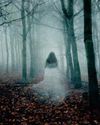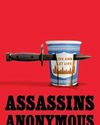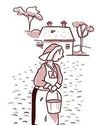試す 金 - 無料
Education
Writer’s Digest
|September - October 2024
Even if it's not your thing, you're probably familiar with the term dark academia.

It's a subgenre that often includes things like secret societies and magic or the supernatural and themes of intellectualism, obsession, and elitism. It is generally placed in-surprise!― an academic setting like a private school or university.
Dark academia is one of those interesting subgenres that is so flexible, it can be used in horror, mystery, and even general fiction. You see it employed in young adult literature (like Ace of Spades by Faridah Abíké-ĺyímídé or A Deadly Education by Naomi Novik) and adult (Babel by R. F. Kuang or Donna Tartt's The Secret History). It's a subgenre that is only gaining more popularity as time passes.
But dark academia is just one way you can utilize education in your books. Even if your story isn't set in a school or doesn't deal with school-aged characters, you must have a basic understanding of how education is utilized and affects the people in your world. For the purpose of this article, formal education refers to an organized and regulated system that follows a curriculum and provides certifications or degrees. Let's get into it!
ELEMENTS OF EDUCATION
Let's imagine a high fantasy story where a young woman has traveled from a distant, rural land and arrived in the country's capital. She was never formally trained to read and write, though she knows enough to get by, and she's very savvy when it comes to mental math. What would her opportunities be? She wouldn't be able to work most jobs that require more familiarity with written language, though she might be able to get by with a business bookkeeping job if she can use her own devised system of writing. How would others view her? Would they look down on her for being less educated than they are or would they see themselves in her because they also weren't afforded opportunities for formal education? Would she be able to pursue an apprenticeship or apply for higher learning if she so desired?
このストーリーは、Writer’s Digest の September - October 2024 版からのものです。
Magzter GOLD を購読すると、厳選された何千ものプレミアム記事や、9,500 以上の雑誌や新聞にアクセスできます。
すでに購読者ですか? サインイン
Writer’s Digest からのその他のストーリー
Writer’s Digest
On Music Publications, Initiative, and Creating Your Own Channel
Usually when I share markets in this column, I find a few in a specific category that are open to freelance writers—that is, they have rather expansive and detailed instructions on how to submit.
5 mins
July/August 2025
Writer’s Digest
Small But Mighty
Why small presses might be the perfect home for your book.
9 mins
July/August 2025

Writer’s Digest
BUILDINGBETTERWORLDS
It's probably not a shock to you—especially if you've read quite a bit of my work here at WD—but one of my favorite shows of all-time is “Supernatural.”
5 mins
July/August 2025

Writer’s Digest
A Change (of Scenery) Would Do You Good
How to vary your setting to your story’s advantage.
7 mins
July/August 2025

Writer’s Digest
No, You Can't Use AI
Think about the best cheeseburger you ever had. If you don't eat cheeseburgers for personal, dietary, or religious reasons, substitute your favorite type of food for the sake of the analogy.
7 mins
July/August 2025

Writer’s Digest
FRONTLIST/BACKLIST
Whether hot off the presses or on the shelves for years, a good book is worth talking about.
3 mins
July/August 2025

Writer’s Digest
Ye Olde Writing Rules
We recently stumbled upon a long-lost manuscript, The Limner's Elements of Stylish Prose: Writing During the Plague by E. B. Black the Elder.
2 mins
July/August 2025
Writer’s Digest
The Case for the Colon
If punctuation marks were performers, the colon would be the master of ceremonies: commanding attention, bridging ideas, and spotlighting what matters.
2 mins
July/August 2025
Writer’s Digest
The Disappearing (Reappearing) Literary Journalist
I backed into a career in literary journalism, a disappearing subgenre of creative nonfiction, accidentally because I wrote bad poetry.
5 mins
July/August 2025
Writer’s Digest
Riley Sager
New York Times bestselling thriller novelist Riley Sager writes from the intersection of what entertains him and what he knows readers have come to love and expect from a Riley Sager novel.
14 mins
July/August 2025
